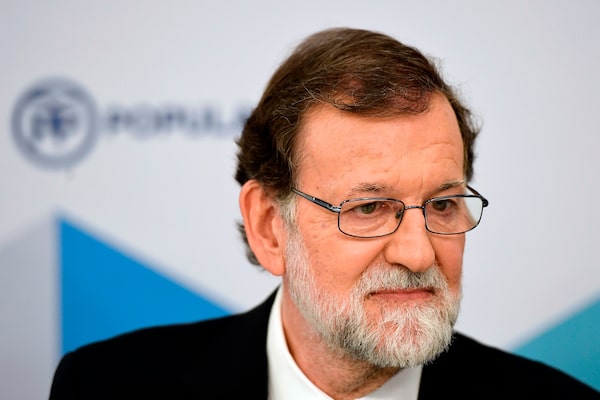
Former Spanish prime minister Mariano Rajoy attends a People's Party meeting in Madrid on June 5, 2018.GABRIEL BOUYS/Getty Images
Spain’s new Socialist government signaled key cabinet member names on Tuesday, including the foreign, economy and budget ministers, as the former ruling party considered torpedoing its own 2018 budget proposal in the upper house of parliament.
The Socialists replaced the center-right People’s Party (PP) as Spain’s government last Friday after parliament passed a no-confidence motion against Prime Minister Mariano Rajoy over a slew of corruption cases.
Rajoy said he would step down from his party’s leadership on Tuesday.
The PP government’s budget proposal is likely to be the new minority administration’s first substantial legislative challenge in the lower house of parliament, where it holds just 84 of the 350 seats.
The long-delayed proposal was passed by parliament only with the help of five lawmakers from the Basque Nationalist Party (PNV). But the PNV infuriated the PP by siding with the Socialists in the no-confidence vote to oust Rajoy’s government.
The draft budget is now in the PP-controlled upper house and some party members have suggested that the conservatives no longer need to back a proposal that contains concessions to the PNV, following the Basques’ pivot to the Socialists.
“We could foresee much more instability, more political obstacles, than there were and more difficulties in running the country,” Rajoy said on Tuesday, referring to a potential block by the PP of the budget in the upper house.
If returned with amendments to the lower house, the budget will need a new vote and, in a deeply fragmented assembly, the Socialists could be forced to renew the 2017 budget for the rest of the year.
SPENDING TARGET
The new cabinet will be officially named on Wednesday.
A close aide to Socialist Prime Minister Pedro Sanchez indicated that a former Andalusia councilor, Maria Jesus Montero, would become budget minister in the new government.
Montero would face the task of setting the public sector spending ceiling for 2019, a necessary first step for Spain’s local and regional governments to make their own budgets.
The Socialists will be keen to announce a rise in spending after years of austerity under the conservative PP but they are still bound to reduce the public deficit to a Brussels target of 2.2 percent of economic output from 3.1 percent in 2017.
Spanish newspapers Expansion and El Pais reported on Tuesday that Nadia Calvino would take over as economy minister, where she would have a coordinating role with Brussels.
Calvino, who is currently director general for the EU budget at the European Commission, can count on a positive economic cycle in Spain, which has one of the highest growth rates in the euro zone.
Sanchez has strong pro-European credentials, and despite his party’s relative weakness in parliament Rajoy also ran a minority government, suggesting only limited political fallout to the change of guard in Madrid.
Sanchez aide Jose Luis Abalos, who Spanish media said on Tuesday would be named public works minister, told Spanish television that Josep Borrell would be the new government’s foreign minister.
Borrell has attracted media attention because of his opposition to Catalan independence. He will take up the position amid a continuing political crisis between Madrid and Barcelona over Catalonia’s independence drive.
“The reaction to the plan to appoint Borrell as foreign minister shows Sanchez is not willing to cut deals with the nationalists and will focus on what can appeal to both (market friendly) Ciudadanos and (anti-austerity) Podemos,” Antonio Barroso, an analyst at Teneo Intelligence, said.